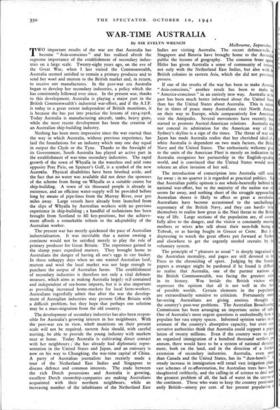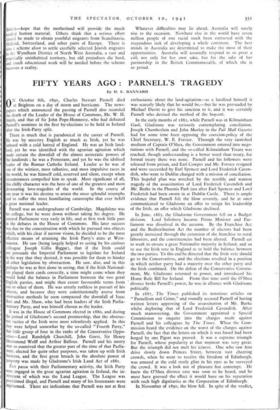WAR-TIME AUSTRALIA
By SIR EVELYN WRENCH Melbourne, September.
TWO important results of the war are that Australia has become " Asia-conscious " and has realised afresh the supreme importance of the establishment of secondary indus- tries on a large scale. Twenty-eight years ago, on the eve of the Great War, when I last visited the Commonwealth, Australia seemed satisfied to remain a primary producer and to send her wool and mutton to the British market and, in return, to receive onr manufactures. In the post-war era Australia began to develop her secondary industries, a policy which she has consistently followed ever since. In the present war, thanks to this development, Australia is playing a major part in the British Commonwealth's industrial war-effort, and if the A.I.F. is today to a great extent independent of British munitions, it is because she has put into practice the lessons of 1914-1918. Today Australia is manufacturing aircraft, tanks, heavy guns, while the most recent development has been the creation of an Australian ship-building industry.
Nothing has been more impressive since the war started than the way in which Australia, without previous experience, has laid the foundations for an industry which may one day equal in output the Clyde or the Tyne. Thanks to the foresight of its Government, South Australia has played an active part in the establishment of war-time secondary industries. The rapid growth of the town of Whyalla in the waterless and arid zone opposite Port Pine, on Spencer's Gulf, is a symbol of the new Australia. Physical disabilities have been brushed aside, and the fact that no water was available did not deter the sponsors of the scheme from fixing on Whyalla as a suitable centre for ship-building. A town of six thousand people is already in existence, and an efficient water-supply will be provided before long by means of pipe-lines from the Murray River, over 300 miles away. Large vessels have already been launched from the slips of Whyalla by Australian workers with no previous experience in ship-building ; a handful of technicians has been brought from Scotland to fill key-positions, but the achieve- ment affords a remarkable tribute to the adaptability of the Australian worker.
The present war has merely quickened the pace of Australian industrialisation. It was inevitable that a nation owning a continent would not be satisfied merely to play the role of primary producer for Great Britain. The experience gained in the slump years expedited matters. They brought home to Australians the danger of having all one's eggs in one basket. In those unhappy days when no one wanted Australian beef, mutton and wool the local market was not large enough to purchase the output of Australian farms. The establishment of secondary industries is therefore not only a vital defence- measure, which aims at making Australia largely self-contained and independent of sea-borne imports, but it is also important as providing increased home-markets for local farm-workers. Australians regretfully admit that after the war the develop- ment of Austqlian industries may present Gitat Britain with a difficult problem, but they hope that perhaps one solution may be a mass-migration from the old country.
• The development of secondary industries has also been respon- sible for Australia's growing interest in her neighbours. With the post-war era in view, whetff munitions on their present scale will not be required, eastern Asia should, with careful nursing, be able to provide the young industry with markets near at home. Today Australia is cultivating direct contact with her neighbours ; she has already had diplomatic repre- sentation in the United States and Japan, and an emissary is now on his way to Chungking, the war-time capital of China. A party of Australian journalists has recently made a tour of the Netherland East Indies and Singapore to discuss defence and common interests. The trade between the rich Dutch possessions and Australia is growing, excellent Dutch steamship-cqmpanies are making Australians acquainted with their northern neighbours, while an increasing number of the inhabitants of the Netherland East possess.
If one of the results of the war has been to make Austr "Asia-conscious," another result has been to make " America-conscious " in an entirely new way. Australia in past has been much better informed about the United Stat than has the United States about Australia. This is natu for in times of peace many Australians visit North Amen on their way to Europe, .while comparatively few Americ visit the Antipodes. Several movements have recently started to promote Austral-American relations. Australia d not conceal its admiration for the American way of life Sydney's skyline is a sign of the times. The threat of war %It Japan has made Australia realise that her cherished ideal of white Australia is dependent on two main factors, the Bri Navy and the United States. The enthusiastic ivelcome gi% to the units of the American Fleet is merely an indication t Australia recognises her partnership in the English-speak world, and is convinced that the United States would nev tolerate an alien invasion of her soil.
The introduction of conscription into Australia still see far away ; in no quarter is it regarded as practical politics. N that Australian public opinion is not whole-heartedly behind national war-effort, but to the majority of the nation war s seems far away, and nothing short of the struggle approac Australian shores is likely to effect so great a revolutio Australians have become accustomed to the unchalleng supremacy of the British Navy, and they can hardly bri themselves to realise how great is the Nazi threat to the Brit way of life. Large sections of the population are, of cour fully alive to the danger, and the visitor is constantly meen mothers or wives who talk about their men-folk being Tobruk, or as having fought in Greece or Crete. But it depressing to watch the great efforts put forward at Sydn and elsewhere to get the urgently needed recruits by voluntary system.
The principle of "pleasure as usual" is deeply ingrained the Australian mentality, and pages are still devoted in Press to the chronicling of sport. Judging by the Sunda papers a stranger might be pardoned if he found it difficul to realise that Australia, one of the partner nations the British Commonwealth, was facing the greatest cn in its history. Woe betide the British visitor wh expresses the opinion that all is not well in the be of possible worlds. Certain elements in the populan are extraordinarily sensitive -to Criticism. Fortunately man far-seeing Australians are giving anxious thought the country's post-war problems. The Australian Broadcast Commission has been arranging an important series of talks. One of Australia's most urgent questions is undoubtedly how 10 populate her vast empty spaces. Informed opinion varies in Its estimate of the country's absorptive capacity, but even con- servative authorities think that Australia could support a polsil- lation of twenty millions. Even if the country were to pl an organised immigration of a hundred thousand settlers pet annum, there would have to be a system of national develop- ment, both on the land, and in the direction of a furthe extension of secondary industries. Australia, even rag than Canada and the United States, has its "dust-bowls." A steady increase in immigration will entail vast irrigation pins, vast schemes of re-afforestation, for Australian trees have bee° slaughtered ruthlessly, and the calling-in of science to deal With the greatest problem of all, the lack of water in the centre d the continent. Those who want to keep the country predoron? antly British—ninety per cent. of her present population is Indies are visiting Australia. The recent defence-talks Singapore and Batavia have brought home to the Austr public the lessons of geography. The common front ag Hitler has given Australia a sense of community of inter not only with the Netherland East Indies, but also with British colonies in eastern Asia, which she did not previo
tC
British—hope that the motherland will provide the much ceded human material. Others think that a serious effort should be made to obtain youthful migrants from Scandinavia, Holland, Switzerland, and other parts of Europe. There is also a scheme afoot to settle carefully selected Jewish migrants in the Wyndham District of North West Australia, a vast and tactically uninhabited territory, but old prejudices die hard, and much educational work will be needed before the scheme becomes a reality. Whatever difficulties may lie ahead, Australia will surely rise to the occasion. Nowhere else in the world have seven million people of one racial stock been entrusted with the stupendous task of developing a whole continent. The best minds in Australia are determined to make the most of their opportunities. Australia will assuredly respond to so great a call, not only for her own sake, but for the sake of her partnership in the British Commonwealth, of which she is so proud.



























 Previous page
Previous page